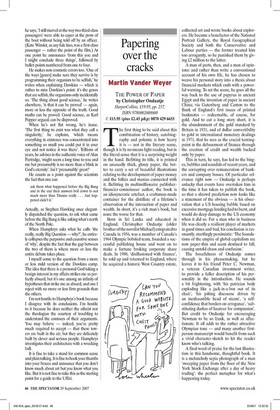Papering over the cracks
Martin Vander Weyer THE POWER OF PAPER by Christopher Ondaatje HarperCollins, £19.95, pp. 237, ISBN 9780002008600 £15.95 (plus £2.45 p&p) 0870 429 6655 The first thing to be said about this combination of history, autobiography and polemic is how heavy it is — not in the literary sense, though it is by no means light reading, but in the literal sense that it is a surprising weight in the hand. Befitting its title, it is printed on unusually thick, glossy paper, the better to carry a set of beautiful illustrations relating to the development of paper money and the follies and manias connected with it. Befitting its multimillionaire publisherfinancier-connoisseur author, the book is an idiosyncratic artefact, a craftsman-made container for the distillate of a lifetime's observation of the interaction of paper and wealth. In short, it's a rich man's book, but none the worse for that.
Born in Sri Lanka and educated in England, Christopher Ondaatje (older brother of the novelist Michael) emigrated to Canada in 1956, was a member of Canada's 1964 Olympic bobsled team, founded a successful publishing house and went on to make a fortune broking corporate share deals. In 1988, 'disillusioned with finance', he sold up and returned to England, where he acquired a historic West Country estate, collected art and wrote books about explorers. He became a benefactor of the National Portrait Gallery, the Royal Geographical Society and both the Conservative and Labour parties — the former treated him too arrogantly, so he punished them by giving £2 million to the latter.
A man of parts, then, and a man of opinions: and rather than write a conventional account of his own life, he has chosen to weave his personal story into a thesis about financial markets which ends with a powerful warning. To set the scene, he goes all the way back to the use of papyrus in ancient Egypt and the invention of paper in ancient China; via Gutenberg and Caxton to the Bank of England's first issues of printed banknotes — redeemable, of course, for gold. And to cut a long story short, it is the abandonment of the gold standard by Britain in 1931, and of dollar convertibility to gold in international monetary dealings in 1971, that he sees as the crucial turningpoint in the debasement of finance through the creation of credit and wealth backed only by paper.
This in turn, he says, has led to the binges, bubbles and scandals of recent years, and the corrupting over-remuneration of bankers and company bosses. Of particular relevance right now — Ondaatje is perhaps unlucky that events have overtaken him in the time it has taken to publish the book, so that a shrewd prediction now looks like a statement of the obvious — is his observation that a US housing bubble based on excessive mortgage lending had to burst, and would do deep damage to the US economy when it did so. For a man who in business life was clearly a resilient player of markets in good times and bad, his conclusion is resonantly, startlingly pessimistic: 'The foundations of the empire of global capitalism are now paper-thin and seem destined to fall, causing untold chaos and confusion.'
The forcefulness of Ondaatje comes through in his phrasemaking, but he leaves it to his friend Peter C. Newman, a veteran Canadian investment writer, to provide a fuller description of his personality in the introduction. He sounds a bit frightening, with 'his patrician body exploding like a jack-in-a-box out of its chair', 'his jolting discourse driven by an inexhaustible head of steam', 'a selfconfidence that borders on arrogance', 'substituting dashes of hauteur for compassion'. But credit to Ondaatje for encouraging Newman to be so frank, as well as affectionate. It all adds to the rather attractive Olympian tone — and many another firstperson manuscript would benefit from such a vivid character-sketch to let the reader know who's talking.
A final word of praise for the last illustration in this handsome, thoughtful book. It is a melancholy sepia photograph of a man 'sweeping paper from the floor of the New York Stock Exchange after a day of heavy trading': the perfect metaphor for what's happening today.























































 Previous page
Previous page